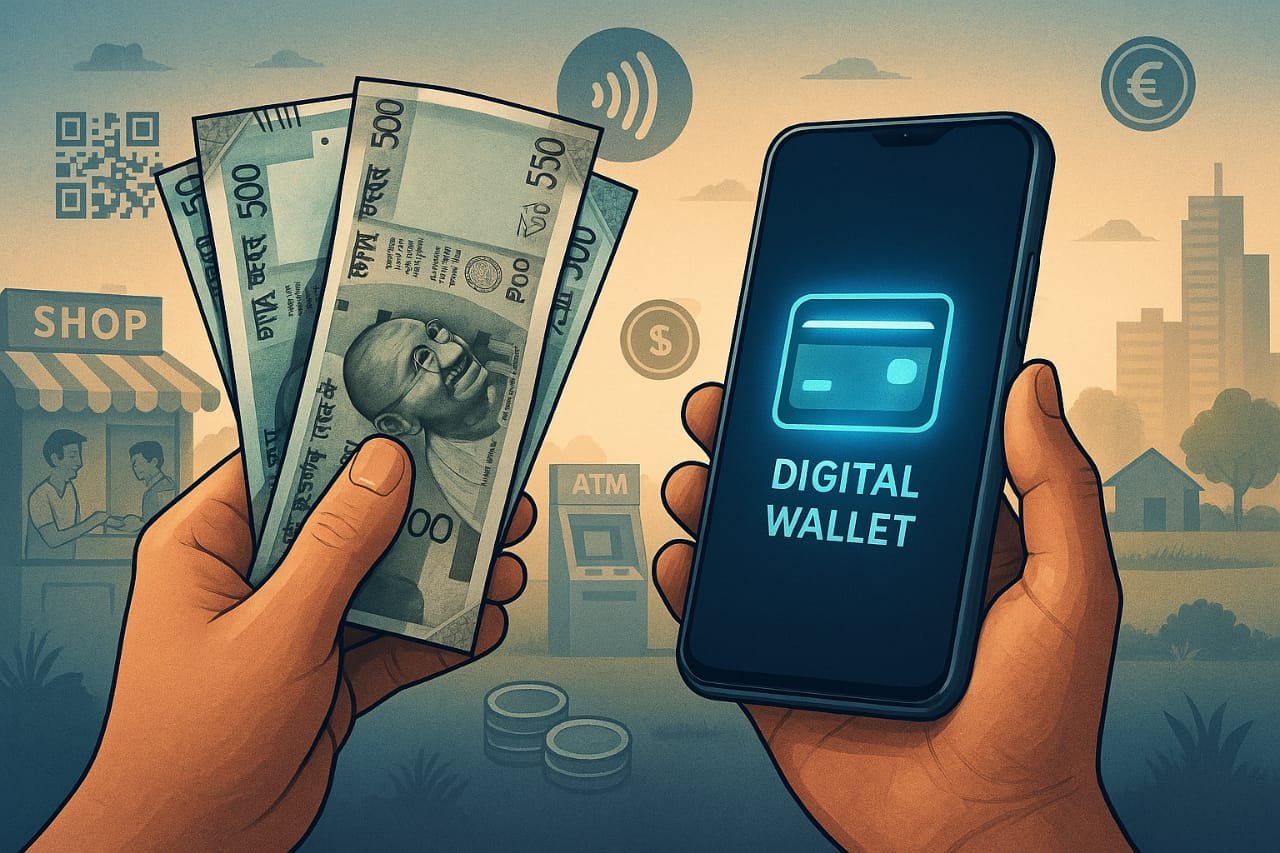Cash: Why It Still Matters in a Digital World
Cash—it’s one of the oldest forms of money, yet in today’s world of UPI, credit cards, and cryptocurrencies, it often feels like a relic of the past. But is cash really on its way out, or does it still hold powerful relevance in our increasingly digital lives?

In this blog, we dive deep into the role of cash in modern society, examining its advantages, limitations, and the shifting perceptions surrounding it. Whether you’re a business owner, a traveler, or just someone looking to manage finances better, understanding the full picture of Money will help you make smarter money choices.
What Is Currency, Really?
At its core, cash refers to physical money—banknotes and coins—that can be used instantly to exchange goods and services. Unlike digital transactions, Money doesn’t require an intermediary like a bank or payment app to complete a transaction. It’s tangible, universally accepted (within a nation), and carries no digital trace.
But the real story of Money goes beyond the wallet.
Cash vs. Digital Payments: A Quick Comparison
| Feature | Cash | Digital Payments |
|---|---|---|
| Speed | Instant | Instant (depends on network) |
| Anonymity | High | Low to None |
| Accessibility | Universal | Requires tech/internet |
| Security | No hacking risk, theft-prone | Hacking risk, password protected |
| Cost | No fees | May involve transaction fees |
| Record Keeping | Manual | Automated |
| Acceptance | Everywhere offline | Growing online & offline |
Both systems serve unique purposes. While digital payment is convenient, Money remains unbeatable in specific contexts, especially where privacy, offline access, or emergency liquidity is concerned.
Why Cash Still Matters in 2025
1. Cash as a Financial Safety Net
During economic uncertainties or natural disasters, cash becomes a critical lifeline. For instance, during power outages or network failures (as seen in hurricanes or earthquakes), digital payments often fail. Money, on the other hand, continues to function.
Moreover, even in developed countries, banking systems are vulnerable to cyberattacks. When Russia’s Sberbank experienced a massive hack in 2023, citizens lined up at ATMs—not to use debit cards, but to withdraw cold hard cash.
2. Budgeting and Spending Control
One of the most powerful tools for money management is switching to Money-based budgeting. The “Money envelope method” forces individuals to allocate a fixed amount for each category (like groceries or transport), helping avoid overspending.
When you pay in Money, you physically see the money leave your hands—creating a sense of accountability that plastic cards rarely deliver.
Pro tip: Try the envelope method for just one month. You’ll be surprised how much you save when you “feel” your spending.
3. Cash Supports the Unbanked Population
According to World Bank data, nearly 1.4 billion people globally remain unbanked. In countries like India, Money still dominates rural economies.
For daily wage earners, street vendors, or seniors who aren’t tech-savvy, Currency is not just money—it’s freedom. It allows them to trade, save, and live with dignity without needing a smartphone or a bank account.
The Emotional and Psychological Power of Cash
Many behavioral economists argue that cash triggers a “pain of paying” that digital transactions suppress. Swiping a card feels effortless; handing over ₹1,000 in cash? That’s a moment of emotional reckoning.
This psychological friction can be used to our advantage. Want to curb impulse purchases or make more mindful buying decisions? Carry cash for non-essential spending.
Moreover, studies have shown that people perceive greater value in cash gifts compared to e-gift cards or transfers. There’s something emotionally satisfying about crisp notes tucked inside a birthday card.
Where Cash Still Reigns Supreme
Despite the rise of fintech, Currency dominates in several areas:
-
Tipping in many cultures still prefers Currency, especially in the hospitality sector.
-
Small vendors and street food joints often offer discounts for Currency payments.
-
Children’s allowances and pocket money are commonly given in Currency, helping kids learn value.
-
Festive gifting in Currency envelopes is a beloved tradition in many Asian cultures.
-
Tourist destinations often rely on Currency due to inconsistent network coverage or lack of PoS systems.

Is Cash Dying? Not So Fast.
It’s easy to believe cash is obsolete when you’re in an urban metro, paying your chaiwala with a QR code. But zoom out, and the global data paints a different story.
According to the Bank for International Settlements, global Currency circulation is actually growing, even as digital transactions rise. The reason? People hoard Currency during uncertainty, use it in informal economies, and keep it as a fail-safe.
Also, central banks like the RBI and Federal Reserve continue to print and circulate fresh currency notes annually. That doesn’t happen with something that’s disappearing.
Personal Perspective: When Cash Saved the Day
A few years ago, while traveling through rural Himachal Pradesh, I lost internet connectivity for three full days. Google Pay and PhonePe? Useless. The only thing that kept me fed, housed, and moving was a small stash of ₹500 notes I had tucked into my backpack.
In that moment, cash didn’t just pay for meals—it bought peace of mind.
Smart Cash Strategies in the Modern Age
While going 100% Currency might not be practical, blending both digital and physical currencies is the smartest route. Here’s how:
✅ Keep a Cash Emergency Kit
Always store 2–3 days’ worth of expenses in a safe place at home or in your bag.
✅ Use Cash for Discretionary Spending
Dining out, shopping, or entertainment? Use Currency to control spending.
✅ Pay Yourself in Cash
For savings, withdraw a fixed amount every month and stash it in a physical savings envelope. You’ll be amazed at how fast it adds up.
✅ Avoid ATM Fees
Withdraw strategically—prefer full withdrawals at your own bank’s ATM to avoid charges.
✅ Blend Cash with Apps
Use expense tracking apps like Walnut or Goodbudget, even for Currency, to maintain financial clarity.
Visual: Benefits of Keeping Cash Handy
Infographic Idea (not shown here):
-
Emergency use
-
Offline accessibility
-
Helps with budgeting
-
Accepted everywhere
-
Enhances saving habits
The Future of Cash: Evolution, Not Extinction
Cash isn’t disappearing—it’s evolving. Central Bank Digital Currencies (CBDCs) may one day merge the privacy of cash with the speed of digital transactions. But until then, paper currency remains an indispensable part of our lives.

Think of it not as old-fashioned, but as a financial tool—one that complements, rather than competes with, digital payment systems.
Final Thoughts
Money still has a pulse. In fact, it’s the heartbeat of resilience, privacy, and accessibility in the financial world. Whether you’re trying to save smarter, prepare for emergencies, or just feel more in control of your money, cash offers what no screen ever can: certainty, tangibility, and trust.
💬 What’s Your Take?
Have you had a moment where Money saved you? Do you still budget with it? Share your thoughts in the comments or check out our related blogs on:
Ready to take control of your money?
👉 Subscribe to our newsletter for weekly insights on smart money moves!
